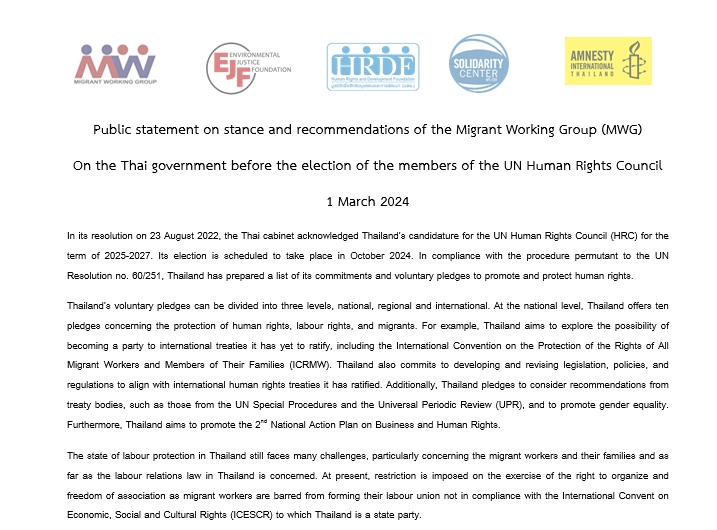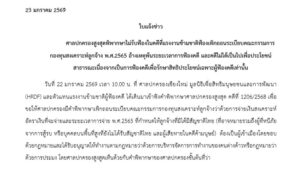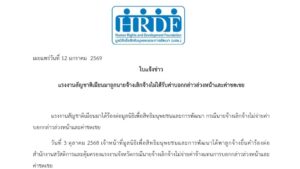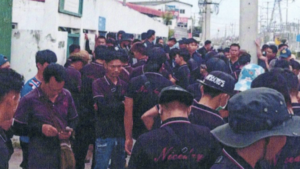
Public statement on stance and recommendations of the Migrant Working Group (MWG)
On the Thai government before the election of the members of the UN Human Rights Council
1 March 2024
In its resolution on 23 August 2022, the Thai cabinet acknowledged Thailand’s candidature for the UN Human Rights Council (HRC) for the term of 2025-2027. Its election is scheduled to take place in October 2024. In compliance with the procedure permutant to the UN Resolution no. 60/251, Thailand has prepared a list of its commitments and voluntary pledges to promote and protect human rights.
Thailand’s voluntary pledges can be divided into three levels, national, regional and international. At the national level, Thailand offers ten pledges concerning the protection of human rights, labour rights, and migrants. For example, Thailand aims to explore the possibility of becoming a party to international treaties it has yet to ratify, including the International Convention on the Protection of the Rights of All Migrant Workers and Members of Their Families (ICRMW). Thailand also commits to developing and revising legislation, policies, and regulations to align with international human rights treaties it has ratified. Additionally, Thailand pledges to consider recommendations from treaty bodies, such as those from the UN Special Procedures and the Universal Periodic Review (UPR), and to promote gender equality. Furthermore, Thailand aims to promote the 2nd National Action Plan on Business and Human Rights.
The state of labour protection in Thailand still faces many challenges, particularly concerning the migrant workers and their families and as far as the labour relations law in Thailand is concerned. At present, restriction is imposed on the exercise of the right to organize and freedom of association as migrant workers are barred from forming their labour union not in compliance with the International Convent on Economic, Social and Cultural Rights (ICESCR) to which Thailand is a state party.
Efforts have been initiated to revise fishery laws due to the increasing vulnerability of fishing workers to forced labor. There is also concern over children being allowed to take on dangerous jobs in the industrial sector, including the fishing industry. Discrimination persists regarding access to social benefits for domestic workers and agricultural workers.
Moreover, there is a lack of clear measures to protect asylum seekers, especially those fleeing neighboring countries affected by political unrest. These individuals often face prosecution under immigration law and involuntary repatriation, breaching the UN Convention Against Torture and Other Cruel Inhuman or Degrading Treatment or Punishment, of which Thailand is a state party. Therefore, the direction of management and protection of human rights of migrant workers and asylum seekers amidst the ongoing armed conflicts in Myanmar is indicative of the determination to protect and commit to human rights principles in Thailand and the level of trust in international community concerning how appropriate if Thailand is elected as member of the UN Human Rights Council
The Migrant Working Group (MWG) and its alliance of human rights and civil society networks have proposed these recommendations and demands to the Thai government for the development of measures to protect and defend human rights, particularly among migrant workers and asylum seekers as follows;
1. Consider to ratify international treaties concerning migrant workers and asylum seekers including the ratification of the International Convention on the Protection of the Rights of All Migrant Workers and Members of Their Families (ICRMW), the Convention on the Status of Refugees, and the International Labour Organization (ILO) Conventions No. 87 on Freedom of Association and Protection of the Right to Organise and No. 98 on the Right to Organise and Collective Bargaining. This can serve as an assurance and framework for the development of domestic laws to protect human rights of migrant workers and asylum seekers.
2. Proceed to develop the strategic plan for management of migrant workers including a strategy for the protection of migrant workers with action plans in response to the violence and rights violations in Myanmar.
3. Consider to review the National Screening Mechanism (NSM) for persons who are unable to return to their country of origin. At the moment, asylum seekers who apply for protection from Thailand are still subject to prosecution invoking the immigration law and this should be considered the double violations of their human rights. In addition, a national strategic plan should be developed to systematically manage and determine statuses of refugees and asylum seekers.
4. A screening mechanism should be developed and implemented before deporting asylum seekers to face a risk to their life and persecution to ensure no refugees and asylum seekers are repatriated to face persecution.
This can help to build up assurance and trust within international community that Thailand is sincere and committed to protecting human rights of all groups and to ensure the protection
human rights of migrant workers, refugees, asylum seekers and other people in Thailand and to ensure Thailand can proudly sit as member of the UN Human Rights Council.




